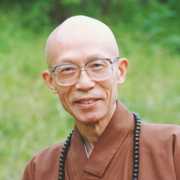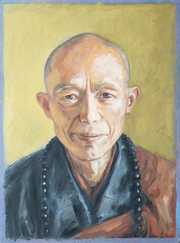Dharma Library
A large collection of articles, from past issues of New Chan Forum and more besides.
- Search by keywords, using the search box
- Or click on the buttons found below the listed articles to select by categories:
-
No Going by Appearances
Chan Master Sheng Yen |Read more of: No Going by AppearancesA talk by Chan Master Shengyen, Excerpted from Chan Magazine and lightly edited.
Outwardly like a complete fool,
Inwardly mind is empty and real.Often, it is a monk who appears slow and some-what dumb who is the great practitioner; and the monk who appears to be extremely sharp and knowledgeable is the one who often needs to practice more diligently. Do not concern yourself with or waste time…
-
Meeting Shi-Fu
Chan Master Sheng Yen |Read more of: Meeting Shi-FuOn retreat with Shifu many people have had encounters with him that must have surprised them. Shifu, too, encounters people who surprise him! The outcome of such meetings is often valuable. Sometimes when you meet a Buddha on the road it might be worthwhile seeing what he has to say before you kill him! At the beginning of a new Millennium let us see what happens when you bump into a Master. Of…
-
Prerequisites for Chan Practice
Chan Master Sheng Yen |Read more of: Prerequisites for Chan PracticeThis article is reprinted from Chan Magazine. Fall 1998, p32-35. Based on several lectures by Shih Fu, edited by Dan Stevenson, adapted for NCF by John Crook.
The Chinese term for practising Chan is ts'an-ch'an, which means to investigate, engage, or dig into (ts'an) the heart or living enlightenment of the Chan tradition. It is often said in Chan that the door to Chan is "no door," that the…
-
Chan Attitudes
Chan Master Sheng Yen |Read more of: Chan AttitudesOn the wall of the dining hall in the Chan Center in Elmhurst, New York, hangs a notice summarising the attitude to be adopted by resident and visiting practitioners. These suggestions seem to provide very sensible guidelines for a life of appropriate relatedness with others, not only within but also outside the meditation hall. So we present them here, slightly edited, for your reflection. They…
-
Reading Sutras as a Spiritual Practice
Chan Master Sheng Yen |Read more of: Reading Sutras as a Spiritual PracticeA talk delivered at Tibet House in New York City, on 5 November, 1994 and edited by Linda Peer and Harry Miller, edited with permission for NCF by John Crook 1998. In this talk Shifu tells us about the traditional uses to which the Sutras are put in China. Some of us may like to make use of these methods. For Westerners Sutra reading is also important. In particular the oldest Sutras, the ones…
-
Words of Encouragement to Disciples
Chan Master Sheng Yen |Read more of: Words of Encouragement to DisciplesBelieve in the Buddha, learn the Dharma, respect the Sangha;
Triple gem is the bright lamp of ten thousand generations.
Uplift the quality of mankind;
Establish the pure land in the human world.
First, understand grace and the repayment of grace;
To benefit others is to benefit oneself.
To make one's best effort is the highest virtue;
Don't create difference between one another or argue for more or less.
… -
Is the View of Practice More Important than Practice Itself
Chan Master Sheng Yen |Read more of: Is the View of Practice More Important than Practice ItselfPublished with permission and lightly edited from Chan Magazine. Spring 1994 11-15.
Shifu, I have a question. A Chan aphorism says, "The practice is important but the view of practice is even more important." It seems to me this is a contradiction of Chan because any view I hold must be subjective and a distortion of truth and therefore an obstruction. If the ego goes away in the experience of… -
Not Knowing is Knowing
Chan Master Sheng Yen |Read more of: Not Knowing is KnowingA lecture given on retreat at the Meditation Centre, New York, reprinted by kind permission from the Chan Magazine Fall 1993 p19 and slightly edited for this presentation.
Knowing dharmas is not knowing Not knowing is knowing the essential... The highest principle cannot be explained: It is neither free nor bound Lively and attuned to everything It is always right before you. 1
The Chan sect…
-
A Mind like Snow
Chan Master Sheng Yen |Read more of: A Mind like SnowGiven on November 14th 1993, published in Chan Magazine, Winter 1995. Presented here lightly edited with permission.
In day to day living, you may find it extremely difficult to settle the mind. It might seem that the only time the mind feels settled is when there is nothing to do. When something happens, either externally or internally, or when you encounter gain or loss, the emotions are…
-
Always Harmonise with Living Beings
Chan Master Sheng Yen |Read more of: Always Harmonise with Living BeingsText selected from 'The Compassionate Vows of Bodhisattva Samantabhadra'. Chan Magazine Winter 1993 with permission. Lightly edited.
'Living beings' means all sentient beings. Harmonising with living beings means giving to sentient beings whatever they wish. Even so, if they ask for your head, do you give it to them? If they ask for your body, do you give it to them? If they ask for your money,…
Featured
By author
More
©Western Chan Fellowship CIO 2026. May not be quoted for commercial purposes. Anyone wishing to quote for non-commercial purposes may seek permission from the WCF Secretary.
The articles on this website have been submitted by various authors. The views expressed do not necessarily represent the views of the Western Chan Fellowship.
Permalink: https://w-c-f.org/Q358


